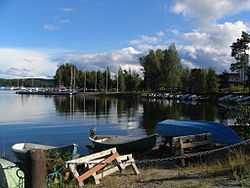Säynätsalo
From Wikipedia, the free encyclopedia
| Säynätsalo | ||
|---|---|---|
| Former Municipality | ||
 | ||
| ||
 | ||
| Coordinates: 62°8.25′N 25°46.9′E / 62.13750°N 25.7817°ECoordinates: 62°8.25′N 25°46.9′E / 62.13750°N 25.7817°E | ||
| Country | Finland | |
| Region | Central Finland | |
| Sub-region | Jyväskylä sub-region | |
| Founded | 1924 | |
| Consolidated | 1993 | |
| Area[1] | ||
| • Total | 9.0 km2 (3.5 sq mi) | |
| Population (November 2010) | ||
| • Total | 3,340 | |
| • Metro density | 371/km2 (960/sq mi) | |
| Time zone | EET (UTC+2) | |
| • Summer (DST) | EEST (UTC+3) | |
Säynätsalo is a former municipality in Finland and a part of Jyväskylä. As of November 2010 its population was 3340. Säynätsalo municipality consisted of islands of Säynätsalo and Lehtisaari and also a part of Muuratsalo island. All of the islands are located on the Lake Päijänne. Also a small slice of land on the continent was part of the municipality.
Säynätsalo is famous for Säynätsalo Town Hall.
Gallery
-

A view from Säynätsalo Bridge towards Kinkomaa
-

A house in Säynätsalo
-

Säynätsalo Centre
-

Louhunsalmi Suspension Bridge
-

Teollisuustalo
-

Säynätsalo harbor
-

Plywood Factory
References
- ↑ "Area by municipality as of 1 January 2008" (PDF) (in Finnish and Swedish). Land Survey of Finland. Retrieved 23 November 2010.
This article is issued from Wikipedia. The text is available under the Creative Commons Attribution/Share Alike; additional terms may apply for the media files.


